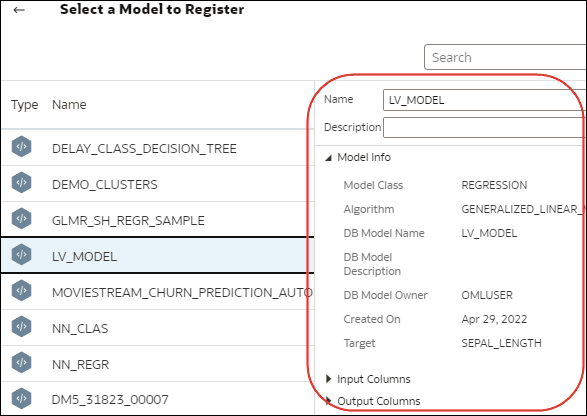Oracle Analytics integreren met Oracle Cloud Infrastructure Data Science
Oracle Analytics integreren met Oracle Cloud Infrastructure (OCI) Data Science om machine learning en kunstmatige intelligentie uit te voeren zonder dat u expert bent op het gebied van gegevenswetenschap. Bijvoorbeeld: Bij gezondheidszorggegevens kan een verwachtingsmodel u helpen om risicofactoren in kaart te brengen en te voorspellen hoe groot de kans is dat een patiënt na behandeling opnieuw moet worden opgenomen.
Vereisten voor het integreren van OCI Data Science modellen in Oracle Analytics
Dit zijn de vereisten voor het integreren van OCI Data Science in Oracle Analytics.
- Maak een verbinding tussen uw Oracle Analytics instance en uw OCI-service. Zie voor meer informatie: Een verbinding maken met uw Oracle Cloud Infrastructure tenancy.
- In OCI: sla de machine learning-modellen op in de OCI Data Science modelcatalogus. Deze modellen moeten worden gemaakt en opgeslagen met behulp van Oracle Accelerated Data Science Software Development Kit 2.6.1 of hoger om compatibel te zijn met Oracle Analytics.
Policy's die vereist zijn om OCI Data Science te integreren met Oracle Analytics.
Als u Oracle Analytics wilt integreren met OCI Data Science, moet u over de vereiste beveiligingspolicy's beschikken.
De OCI-gebruiker die u opgeeft in de verbinding tussen Oracle Analytics Cloud en uw OCI-tenancy moeten rechten voor lezen, schrijven en verwijderen hebben voor het compartiment met de OCI-resources die u wilt gebruiken. Zorg ervoor dat de OCI-gebruiker die u opgeeft, behoort tot een gebruikersgroep met minimaal de volgende OCI-beveiligingspolicy's. Wanneer u verbinding maakt met een OCI-tenancy vanuit Oracle Analytics, kunt u een OCI API-sleutel of resourceprincipal gebruiken.
Opmerking:
Oracle Cloud ID's (OCID's) zijn resource-ID's die in OCI worden gebruikt.Opmerking:
Als u voor een resourceprincipal alle Analytics instances onder een compartiment wilt opnemen, geeft u{request.principal.type='analyticsinstance', request.principal.compartment.id='<compartmentA_ocid>'} op in plaats van {request.principal.id='<analytics_instance_ocid>'}.| Policy's voor API-sleutels | Policy's voor resourceprincipals |
|---|---|
Allow group <group_name> to read data-science-projects in compartment <compartment_name> |
Allow any-user to read data-science-projects in compartment <compartment_name> where all {request.principal.id='<analytics_instance_ocid>'} |
Allow group <group_name> to read data-science-models in compartment <compartment_name> |
Allow any-user to read data-science-models in compartment <compartment_name> where all {request.principal.id='<analytics_instance_ocid>'} |
Allow group <group_name> to manage data-science-jobs in compartment <compartment_name> |
Allow any-user to manage data-science-jobs in compartment <compartment_name> where all {request.principal.id='<analytics_instance_ocid>'} |
Allow group <group_name> to inspect instance-family in compartment <compartment_name> |
Allow any-user to inspect instance-family in compartment <compartment_name> where all {request.principal.id='<analytics_instance_ocid>'} |
Allow group <group_name> to manage data-science-job-runs in compartment <compartment_name> |
Allow any-user to manage data-science-job-runs in compartment <compartment_name> where all {request.principal.id='<analytics_instance_ocid>'} |
Allow group <group_name> to inspect virtual-network-family in compartment <compartment_name> |
Allow any-user to inspect virtual-network-family in compartment <compartment_name> where all {request.principal.id='<analytics_instance_ocid>'} |
Allow service datascience to use virtual-network-family in compartment <compartment_name> |
Allow service datascience to use virtual-network-family in compartment <compartment_name> |
Allow group <group_name> to manage log-groups in compartment <compartment_name> |
Allow any-user to manage log-groups in compartment <compartment_name> where all {request.principal.id='<analytics_instance_ocid>'} |
Allow group <group_name> to read buckets in compartment <compartment_name> |
Allow any-user to read buckets in compartment <compartment_name> where all {request.principal.id='<analytics_instance_ocid>'} |
Allow group <group_name> to manage objects in compartment <compartment_name> where target.bucket.name='<staging_bucket_name>' |
Allow any-user to manage objects in compartment <compartment_name> where all {request.principal.id='<analytics_instance_ocid>', target.bucket.name='<staging_bucket_name>'} |
Allow group <group_name> to read objectstorage-namespaces in compartment <compartment_name> |
Allow any-user to read objectstorage-namespaces in compartment <compartment_name> where all {request.principal.id='<analytics_instance_ocid>'} |
| Policy voor dynamische groepen | Beschrijving |
|---|---|
Allow dynamic-group <dynamic_group> to read data-science-models in compartment <compartment_name> |
Biedt het Data Science model toegang tot de Data Science taakuitvoering. |
Allow dynamic-group <dynamic_group> to manage objects in compartment <compartment_name> where target.bucket.name='<staging_bucket_name>' |
Biedt Object Storage toegang tot de Data Science taakuitvoering. |
Allow dynamic-group <dynamic_group> to use log-content in compartment <compartment_name> |
Biedt Log toegang tot de Data Science taakuitvoering. |
Opmerking:
Wanneer u<dynamic_group> opgeeft, gebruikt u een matchregel in deze indeling: alle { resource.type='datasciencejobrun', resource.compartment.id='<compartment_ocid>' }, waarin <compartment_id> de Oracle Cloud ID is van het compartiment dat de Data Science modellen bevat.Een OCI Data Science model beschikbaar maken in Oracle Analytics
Voordat u gegevens kunt analyseren met OCI Data Science modellen (Oracle Cloud Infrastructure), moet u deze registreren in Oracle Analytics.
